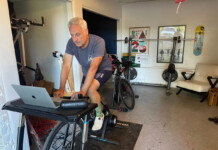Good coaching is always beneficial, though arguably unessential
I’ve always respected the science that sophisticated coaching brings to the table. Depending on your goals and whether or not you feel the need for motivation as well as direction, working with a coach represents a helpful option for recreational and competitive cyclists alike.
I’ve worked with four different coaches over the years, two of whom were elite bike racers. All of them helped me make fitness and strength gains, better structure my workouts and more effectively assess data from my clinical testing, training and racing.
The real questions are whether coaching is necessary, and if so, whether it’s worth the cost.
Do only the coached survive?
I’ve raced hundreds of events over the past several years, and many of the top finishers were not working with a coach. Some had worked with coaches in the past, many had been (or still were) mentored by more experienced riders, and still others had simply figured things out on their own.
Of course, many of the strongest riders I’ve competed against have indeed been coached athletes. And while it’s true that these individuals had often demonstrated the most talent and ambition before seeking professional guidance, generally they insisted that coaching helped them take their cycling to the next level.
Taking advantage of science while taking personal initiative
That said, if you don’t have the money or don’t want to spend it, there are plenty of accomplished riders and racers who have gleaned helpful scientific information and implemented it without requiring outside help. Below are insights provided by two of my California-based teammates.
Pro mountain biker and elite road racer, Peter Graf, explains:
“I’ve come to the conclusion that it really depends on the rider and his or her personality. The bottom line is, what are your goals in this sport, and can you objectively assess yourself, your training, and your results?
“This is a hard thing to do for anyone. But with more and more data available (i.e. power meters) it is easier to take yourself and your biased views out of the equation. Still, despite these ‘objective’ measures, people struggle to be objective and honest with themselves. So this is where coaching can be useful. Other than that, I think you can get by on your own.
“Also, if you come from an athletic background, played competitive sports in high school or college, you have a better understanding of what it takes to train, compete and how to suffer. For me, I read some books, did some research online, used a power meter for 18 months and that was enough. I learned what I needed to do.”
Adam Ross, an elite road racer and triathlon dabbler who rarely trains more than eight hours per week, adds:
“Coaching is not essential, but it depends who you are. I read The Cyclist’s Training Bible by Joe Friel during my first race season. It should be required reading for all cyclists because it helps you understand how you need to structure your training and riding. After that I had the privilege of getting general, team training plans while with UC Davis from the UCD sports med guys (i.e. Testa, Heiden, Van Sickle). Those were helpful, and I noticed that it resembled Friel’s stuff, so as far as ‘cutting edge’ I didn’t find it that different.
“I’ve been doing my own training plans for the last several years. I don’t need to write anything down anymore – I just know what I need to do at certain parts of the year and leading up to specific races. At this point, I don’t think a coach could squeeze more benefit out of the 8 hours a week that I’m putting in. You wouldn’t believe what I can do in the 14 miles between work and home!
“The beauty of self-coaching is that you’re forced to understand the principles of structured training. If you’re paying someone else to do it, I don’t think you fully understand why you’re doing things. I also think a lot of people are just paying coaches so that they’ll have someone to stay on their butt about sticking to their training; it’s an expensive form of accountability!”
Reducing uncertainty
One of the most common benefits coached riders cite is how coaching can diminish unsettling uncertainty. Many riders have told me that they work with a coach so that they no longer need to worry about their training – what to do and when to do it.
However, a counterpoint is a trip I made with a teammate last year to the Texas A&M wind tunnel for aerodynamics testing. It illustrates that professional guidance is helpful, but at some point you can use what you’ve learned to make similar gains without supervision:
Upon returning to California following the tunnel sessions, that teammate kept thinking that if we had only had tighter fitting clothing, been more prepared as far as aero bars, etc, the testing would have been more productive, and was convinced we needed to return for further testing.
However, the aerodynamics guru we had worked with reassured us, “You’ve spent time in a wind tunnel and learned a lot. Just having that experience means you don’t need to worry about it anymore. Now it’s time to apply what you’ve learned out in the real world.”
Efficiency is king
Ultimately, coaching’s biggest value proposition may be the efficient use of life’s most precious and limited resource – TIME.
Ross mentions above that he’s figured out how to maximize a 28-mile round-trip commute on his own. But for those with insufficient patience, willingness, experience or confidence, the guidance of a good coach can help get the most out of hours spent cycling.
It’s personal
In this regard, I’m not necessarily a good role model. Although I know how to maximize training time via principles such as specificity, supercompensation and proper recovery to avoid overtraining, I frequently opt for what makes me happiest: being outdoors as much as possible on a bike.
I like logging long miles – hard, medium and easy – to burn calories so that I’m always race weight and to stay limber. I enjoy looking forward to a canyon climb instead of watching a power meter. Most of all, cycling is social for me; I’ve met friends of a lifetime in several different countries while pedaling and not worrying too much about a workout.
I’ve ridden as strong when self-coached as I have when under the guidance of a certified expert. Sure there are coached riders who are faster than me. But I’ve ridden stronger, longer, than many riders who pay a hefty sum for coaching each month. I’ve done okay, and so will you, no matter what you decide.
Ingredients for success
It may be power, lactate threshold, structure or the monitoring of a skilled professional that helps you make the most of your training and be more competitive, whether it’s out on a weekly group ride or at a race. And there is no doubt that mentors – certified or not – can play a key role in your progress, regardless of your experience and level of fitness.
Yet even world renowned physiologist and coach Massimo “Max” Testa emphasizes balancing priorities. In a phone interview I conducted with him last year, he compared training to making a good risotto: a little bit of this, a little bit of that, depending on what you want and like. Then prepare with care. And enjoy!






